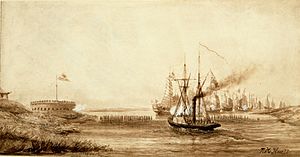Broadway expedition
| Broadway expedition | |||||||
|---|---|---|---|---|---|---|---|
| Part of the First Opium War | |||||||
 The steamer Nemesis engaging the Houchung fort and Chinese war junks, 13 March 1841 |
|||||||
|
|||||||
| Belligerents | |||||||
|
|
|||||||
| Commanders and leaders | |||||||
| James Scott | Unknown | ||||||
| Strength | |||||||
| 6 ships | 6 forts | ||||||
| Casualties and losses | |||||||
| 3 wounded | 9 junks destroyed 105 guns captured |
||||||
The Broadway expedition was a British military expedition that explored the Broadway River (present-day Xi River) in Guangdong province, China, on 13–15 March 1841 during the First Opium War. The river was also called the Inner Passage or Macao Passage as it served as an intricate channel from the Portuguese colony of Macao to the Chinese city of Canton (Guangzhou). The expedition was the first time a European vessel traversed the passage, and was believed by the Chinese to be inaccessible to foreigners due to the shallowness and intricacy of the channel as well as the forts along the banks. The iron steamship Nemesis had a shallow draught of 6 feet (1.8 m), which was a major advantage in navigating the river. Despite being over 600 tons burden, the ship was able to navigate through a river that frequently had less than 6 feet of water and through mud in areas of only 5 feet (1.5 m).
Operations began on the morning of 13 March in Macao. Captain James Scott commanded the fleet, which consisted of HMS Samarang and the East India Company steamships Nemesis and Atlanta. A further three boats accompanied the Nemesis; two from the Samarang and one from the Atlanta. On board the Nemesis of Captain William Hall was Plenipotentiary and Chief Superintendent of British Trade Charles Elliot, Deputy Superintendent of Trade Alexander Johnston, and interpreters John Morrison and Robert Thom. A British officer wrote that the interpreters' "knowledge of the language and their good judgment frequently enlisted in our favour the people of the country, who might have offered great annoyance, and they were often able to mitigate the hardships even of war itself."
...
Wikipedia
